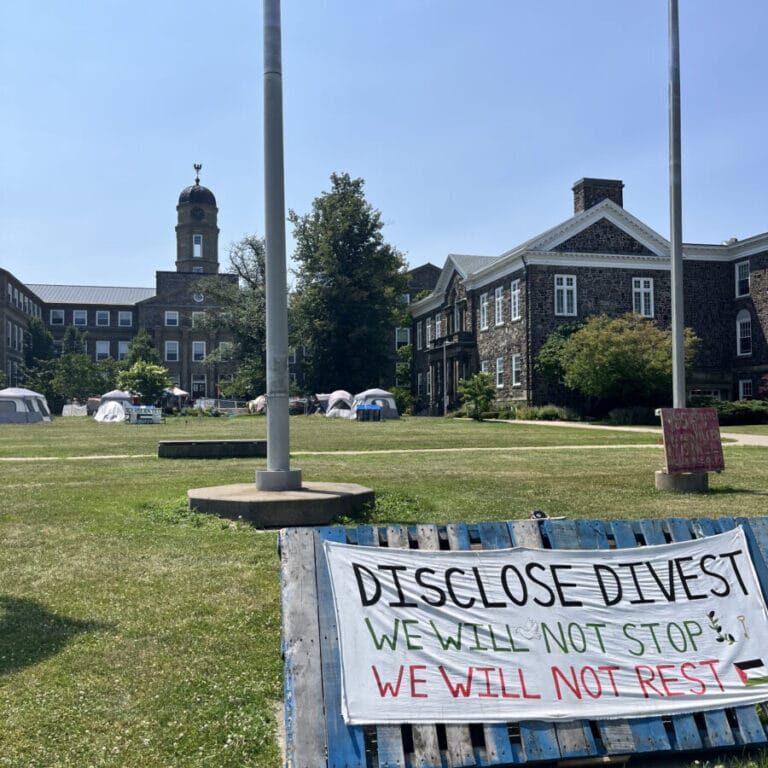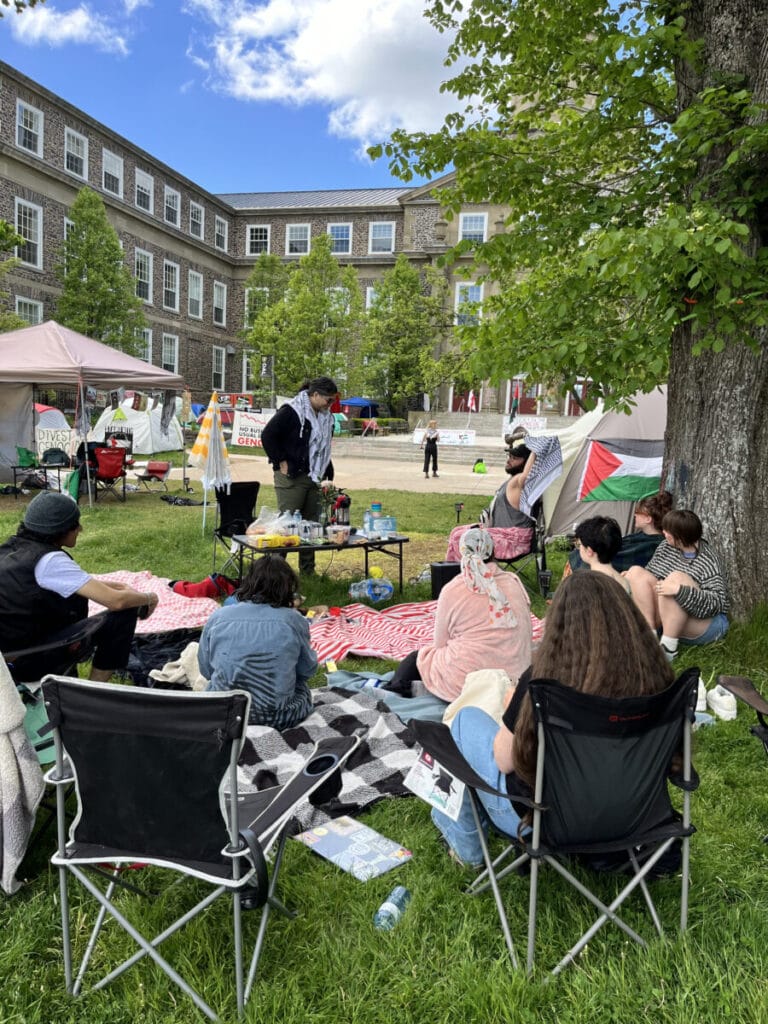
What did we miss? The Pro-Palestinian encampment on Dalhousie University’s quad
While the Gazette was on summer break, the Students for the Liberation of Palestine set up an encampment on Dal’s quad that lasted for 78 days
On May 12, a group called the Students for the Liberation of Palestine set up an encampment they named Al Zeitoun University on Dalhousie’s Studley Quad. Their goal was to get Dalhousie University to disclose and divest from all investments linked to Israel.
Among the group of people at the encampment was Owen Skeen, president of the NSCAD student union. He is a member of the group called Students for the Liberation of Palestine which includes students from Dalhousie, the University of King’s College, Saint Mary’s University and Mount Saint Vincent University.
“[The encampment] was a place for students to gather, talk about Palestine and be a part of a broader community of solidarity and respect and humanity,” said Skeen.
The encampment lasted for 78 days. Dalhousie released a trespassing notice on July 26 demanding students vacate the encampment by July 28. Early in the morning on July 29, Dalhousie security began to tear down the encampment.
The final days of the encampment
“Leading up to the end, there was a sense of exhaustion, a sense of agitation, a sense of perhaps some betrayal; that students had been sort of promised this place to stay,” said Skeen. “That if they kept up their end, which was to be a productive and safe and caring space, that the university would keep up their end, which was to not call the police and to not forcefully, violently remove the students.”
Some members of the faculty also supported the encampment. They offered counselling, lectures and support to students participating in the encampment. One of these professors was Ajay Parasram, an associate professor at Dalhousie in the Departments of International Development and History.
“I thought Dalhousie’s initial response was quite good,” said Parasram. “They were generally supportive, they were inclusive of the idea of public space for protests.”
Parasram praised the efforts of the participants in the encampment, including supporting the escalation of the protest after students waited for a response from the university for over 70 days.
“[The Students for the Liberation of Palestine] were always clear from the very beginning that their reason for being there was to convince the university to adopt the stance of boycott, divestment and sanction in order to apply pressure on Israel to end its genocide in Gaza,” said Parasram.
He said that after a month and a half of the university “kicking the ball down the road” and not committing to concrete meetings, students escalated their approach by occupying the Henry Hicks administrative building to hold a press conference. This press conference was held two days before the trespassing tickets were issued.
“On Sunday, the day that they were supposed to be evicted, there was a massive, beautiful community gathering,” said Parasram. “Hundreds and hundreds of people came out to support the encampment, speeches from all kinds of different communities, teachings were offered on various subjects. It was really a beautiful evening.”
When the deadline came for protestors to leave, nothing happened. Everyone went to bed as usual according to Parasram.
Around six o’clock the next morning, private security and Dalhousie security arrived and started breaking up the encampment. Parasram alleges that while breaking it up, security destroyed original artwork and historical pieces that were given on loan to the encampment.
According to Parasram, the students involved with the encampment then learned that a meeting they had scheduled with the university for that morning was cancelled.
Skeen said the encampment then moved to the Kenneth C. Rowe Management Building after security brought industrial metal fences to the quad.
“It was at that point that the very difficult decision was made by students to move … to ensure that the community would be kept safe and that they could not be hemmed in and then harassed or brutalized by police,” Skeen said.
Police then arrived at the Rowe Building, bringing an immediate and final end to the encampment.

The university’s response
After people cleared out of the quad, Dalhousie sent out an email to students stating that due to safety concerns, all Dal campuses were temporarily closing.
Parasram believes that the email was unnecessarily alarmist.
“People were in class and getting this, not knowing if they were under some kind of an attack. It was a really reckless move in my mind that sought to create a false sense of fear surrounding what was a reasonable set of actions taken by pretty responsible students,” Parasram said.
The next day students received another email, this time from Dalhousie President Kim Brooks and Rick Ezekiel, the Vice Provost of Student Affairs. The email said that the tone of the encampment had “shifted significantly”, and said that encampment participants “sought out, harassed, and intimidated individuals working and studying in the building.” The email thanked Dalhousie security services and said, “We remain committed to constructive engagement and emphasize that fostering a community where people can listen, learn, and thrive, requires navigating hard things together in respectful ways.”
A student from Dalhousie’s Jewish Law Students Association spoke to The Dalhousie Gazette under the condition of anonymity. She said she believes Dal handled the situation well.
“They opened transparent communication. They gave ample notice when the encampment needed to come down. When things went awry that day, security was on it,” she said. “The police were already notified. It was handled within 24 hours.”
The student stipulated that she was not in Halifax while the encampment was ongoing.
“I don’t think if I was here, I’d be bothered by it or feel unsafe. If you compare it to [the] McGill or U[niversity] of T[oronto] [encampments], it’s a dull scene in comparison. I think the school did a really good job with communicating with the individuals in the encampment,” the student said.
Although she did not feel threatened by the encampment itself, she said she was scared to return to school because of how the encampment ended.
“I think my and a lot of people’s opinions are that this is private property. If you let it start, when will it end?” she said.
The student became more concerned once she learned the encampment briefly moved into Dalhousie buildings.
“That is intimidating because they went from being calm all summer long, not causing any sort of violence or upset or uproar or intimidation, to intense acts of intimidation,” she said. “And I think that was what was really upsetting as a Jewish student.”
The student clarified that the Jewish Students Law Association is a Jewish society and not an Israeli society.
“There’s a really big difference between the two,” she said. “Not all Jewish people are Israeli and not all Israelis are Jewish. As a Jewish student on campus, I didn’t necessarily feel scared. If I was an Israeli student on campus, my narrative might change.”
Another professor who frequented the encampment in support of the students was Nouman Ali, a professor in the Department of Civil and Resource Engineering. Ali would visit the encampment at lunchtime to sit down with students and listen to them. He’s concerned that the majority of Dalhousie security workers were student employees.
“We put these students in awkward positions because they are really puzzled by the whole thing,” he said. “They don’t know what to do, because just imagine you’re a student, facing another student.”
“They just looked and said we don’t care”
Ali was once assaulted while supporting students at the encampment. Two people unrelated to the encampment approached him and began to call him names. One of them then pushed him.
“I felt threatened, I’m 69 close to 70,” Ali said. “One of the students went to the Dalhousie security. They said, there’s an outsider, and they assaulted the prof. They [Dal security] did not even budge, they did not even come, they did not even ask, they just looked and said we don’t care.”
Ali described feeling hurt by the incident.
“It bothered me because I’ve been here almost 36 years and I’ve never felt threatened or insecure until that day,” he said. “Then even with the security there, they did not care if something happened to me.”
Yousef AlSayyed Ahmad, president of the Dal Palestinian Society, was the only Palestinian camper for the majority of the encampment period.
“Al Zeitoun University was the most educational experience of my life,” AlSayyed Ahmad said. “I’ve been a student at Dal for five years, and I consumed more knowledge in those 78 days than I did in my five years at Dal.”
Although many parts of the encampment were a positive experience for AlSayyed Ahmad, there were times he felt unsafe. He says he experienced hate speech and was targeted for his identity by another Dal student. When he approached Dalhousie University president Kim Brooks, he said she didn’t do anything to help.
Despite this, AlSayyed Ahmad said, “I’ve never felt as free, unchained and liberated as I did at Al Zeitoun University. This is the first time I felt free and I miss Al Zeitoun University greatly. I know that the Students for the Liberation of Palestine and others will work at great lengths to preserve what we created.”
Dalhousie administration did not respond to the Gazette’s request for comment.






